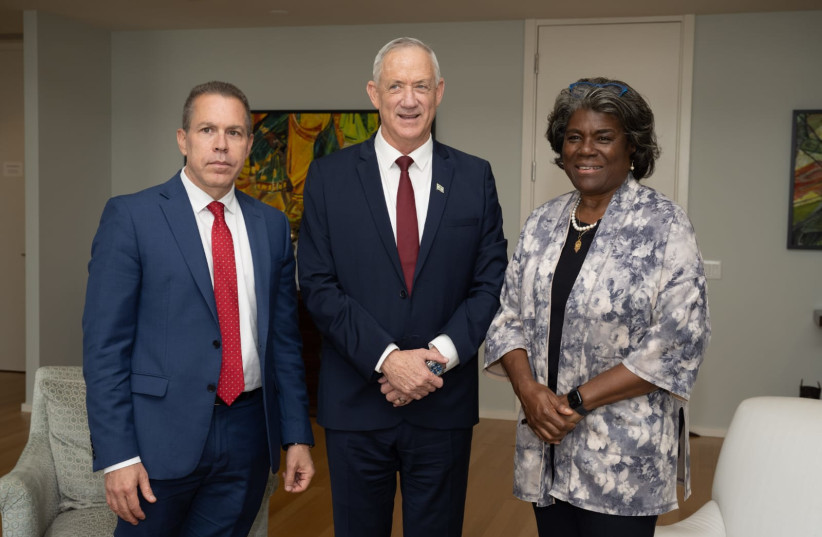Iran has increased its production of hundreds of centrifuges and tripled its enrichment rate at the Fordow underground site in the last year, Defense Minister Benny Gantz revealed to United Nations diplomats.
“According to our assessments, in the past year, the number of advanced centrifuges has more than doubled in the underground facilities of Natanz and Fordow,” he warned, adding that the international community “must ensure military deterrence, in addition to diplomatic and economic efforts. The UN Security Council must take action in face of the Iranian challenge.”
Gantz made comments on Sunday during a series of meetings at the United Nations Headquarters in New York, along with Israel’s Ambassador to the UN Gilad Erdan, director of the Policy and POL-MIL Bureau Dror Shalom and Military Secretary Yaki Dolf.
“We must advance the negotiations, strengthen the stability and prosperity in the region and prevent an escalation that will first of all harm the citizens of Lebanon and the Lebanese state, and bring us back to the start."
Defense Minister Benny Gantz
He met with UN Secretary-General Antonio Guterres, and they discussed the situation in Israel and the Palestinian territories as well as security issues and regional peace, said a statement from Guterres’ office.
The defense minister also met with US Ambassador to the UN Linda Thomas-Greenfield and held a briefing for UN Security Council ambassadors and representatives of the Abraham Accords signatories on the occasion of its two-year anniversary.

He warned that the Islamic Republic is the “No. 1 cause for instability and terror” in the region.
“Iranian activities spread terror and could even spark an arms race,” he said. “Iranian regional and global terror – whether it comes from Iran proper or via well-funded proxies – threatens our economies, energy resources, food security, trade, freedom of navigation and overall peace and stability. This will only worsen if Iran will have a ‘nuclear umbrella.’”
Speaking at The Jerusalem Post conference on Sunday morning, Gantz said that lifting sanctions on Iran would allow it to “double or triple their terror budget.”
Despite the economic hardships facing its own citizens, Iran sends over $1 billion USD to its proxy groups, including over $500 million USD to Hezbollah in Lebanon, hundreds of millions to the Houthis in Yemen, over $100 million USD to Hamas and Palestinian Islamic Jihad in Gaza and tens of millions of dollars to pro-Iranian militias in Iraq.
Addressing the issue of the “open files” – which have led Britain, France and Germany to voice frustrations and raised “serious doubts” with Iran after it tried to link its signing with the closing of UN probes into uranium traces found at three nuclear sites – Gantz said that “we cannot turn a blind eye” and “give Iran a free pass.”
Israel-Lebanon maritime border dispute
Touching on a possible maritime deal between Israel and Lebanon, Gantz said that Jerusalem is keen to make a deal.
“The State of Israel is interested in progressing maritime border negotiations with Lebanon,” Gantz said. “In the end, there will be two gas rigs, one Israeli and one Lebanese. The question is whether we can reach this scenario without an unnecessary escalation as a result of Hezbollah threats.”
There has been cautious optimism that Jerusalem and Beirut are close to signing an agreement on the maritime border dispute after back-and-forth diplomacy by the United States. According to reports, the deal would see the Karish gas field remain in Israel while the Kana field will be owned by Lebanon.
“Establishing a rig on the Lebanese side is in the interest of Lebanon, whose residents do not have a regular electricity supply and are experiencing a devastating economic crisis,” he said, explaining that Israel will also capitalize on its resources.
Despite continued threats by Hezbollah’s Secretary-General Hassan Nasrallah, the Greek-French-owned company that drills in Karish said that gas extraction is expected to start within weeks.
Gantz warned that Israel would not tolerate any threats to Israel’s security by Nasrallah and called on the Security Council to condemn any violation of Israeli sovereignty by the terror group.
“We must advance the negotiations and strengthen the stability and prosperity in the region and prevent an escalation that will, first of all, harm the citizens of Lebanon and the Lebanese state, and bring us back to the start,” he said.
